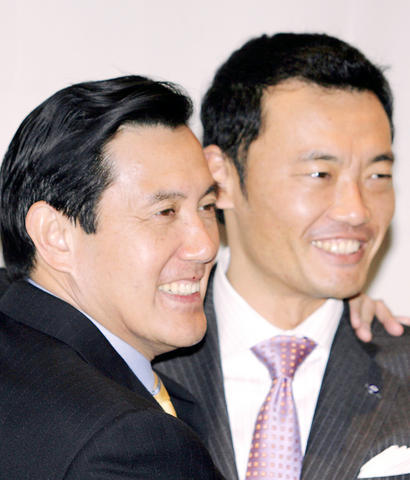Chinese Nationalist Party (KMT) presidential candidate Ma Ying-jeou (
Ma made the remarks when meeting with members of the Japan-ROC Diet Members' Consultative Council in Tokyo, the Central News Agency reported.
The council, better known as the Nikkakon (

PHOTO: AFP
During the meeting, Ma said he would pursue a policy of "no unification, no independence and no armed conflicts" if elected next year.
The presidential candidate said he would neither hold unification negotiations with China, nor support independence for Taiwan.
Ma said he would maintain the "status quo" in cross-strait relations, but would seek to negotiate with China on "normalizing economic ties, signing a peace treaty and increasing Taiwan's presence in the international community."
The presidential hopeful added that he would ask China to dismantle the ballistic missiles aimed at Taiwan before attempting any peace negotiations.
"We will be a responsible stakeholder. We will never unilaterally change the `status quo' and risk regional instability," Ma was quoted as saying.
Ma said he would try to enhance the relationship between Taiwan and Japan, and would make signing of a free trade agreement one of his objectives.
The former KMT chairman said on Wednesday that his visit to Japan was intended in part to alleviate concerns there that he is "anti-Japanese."
"I am neither anti-Japan nor pro-Japan. I hope to understand Japan and I hope the Japanese people will get to know me," Ma told a press conference on Tuesday.
Ma was scheduled to hold a news conference at a Tokyo hotel today before returning home later in the day, the Taipei Economic and Cultural Representative Office said.
Asked for his take on Ma's comments, Democratic Progressive Party presidential candidate Frank Hsieh (謝長廷) said in Taipei yesterday that it was difficult to comment on Ma's remarks because the KMT presidential candidate "changes his mind too much."
Hsieh said it was confusing that Ma was now saying that he doesn't want to pursue unification whereas this had once been his stated goal.
Additional reporting by AP and AFP

US President Donald Trump said "it’s up to" Chinese President Xi Jinping (習近平) what China does on Taiwan, but that he would be "very unhappy" with a change in the "status quo," the New York Times said in an interview published yesterday. Xi "considers it to be a part of China, and that’s up to him what he’s going to be doing," Trump told the newspaper on Wednesday. "But I’ve expressed to him that I would be very unhappy if he did that, and I don’t think he’ll do that," he added. "I hope he doesn’t do that." Trump made the comments in

Tourism in Kenting fell to a historic low for the second consecutive year last year, impacting hotels and other local businesses that rely on a steady stream of domestic tourists, the latest data showed. A total of 2.139 million tourists visited Kenting last year, down slightly from 2.14 million in 2024, the data showed. The number of tourists who visited the national park on the Hengchun Peninsula peaked in 2015 at 8.37 million people. That number has been below 2.2 million for two years, although there was a spike in October last year due to multiple long weekends. The occupancy rate for hotels

Japanese footwear brand Onitsuka Tiger today issued a public apology and said it has suspended an employee amid allegations that the staff member discriminated against a Vietnamese customer at its Taipei 101 store. Posting on the social media platform Threads yesterday, a user said that an employee at the store said that “those shoes are very expensive” when her friend, who is a migrant worker from Vietnam, asked for assistance. The employee then ignored her until she asked again, to which she replied: "We don't have a size 37." The post had amassed nearly 26,000 likes and 916 comments as of this

A cold surge advisory was today issued for 18 cities and counties across Taiwan, with temperatures of below 10°C forecast during the day and into tonight, the Central Weather Administration (CWA) said. New Taipei City, Taipei, Taoyuan and Hsinchu, Miaoli and Yilan counties are expected to experience sustained temperatures of 10°C or lower, the CWA said. Temperatures are likely to temporarily drop below 10°C in most other areas, except Taitung, Pingtung, Penghu and Lienchiang (Matsu) counties, CWA data showed. The cold weather is being caused by a strong continental cold air mass, combined with radiative cooling, a process in which heat escapes from